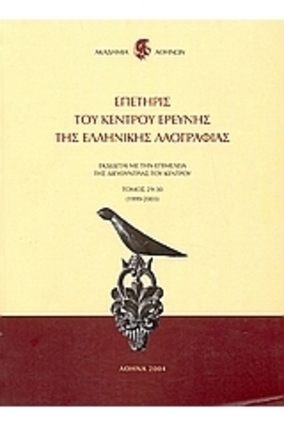Μετρήσεις : Συμβολισμοί καί πραγματικότητα
Part of : Επετηρίς του Κέντρου Ερεύνης της Ελληνικής Λαογραφίας ; Vol.28, 1986, pages 5-28
Issue:
Pages:
5-28
Parallel Title:
Measures and Measuring : Symbolism and Reality
Author:
Abstract:
Owing to the fact that Measuring doesn’ t concern only commercial exchanges between people, but based on the satisfaction of every-day needs in exchanging goods, it touches on human relationships and institutions, like injustice and justice, punishment of out-laws within human or divine justice, the people' s beliefs about the symbolic meaning of measuring have been connected with the rendering of justice in this life as well as in life after death. Simultaneously, measuring as an accurate estimate of the goods offered by God (fruits, animals), but also of people, is considered by public opinion as a crime. The meaning, therefore, of measuring and of accurate counting lead to the creation of a number of relevant preventive and superstitious habits of the people. The refetences to transgressions in the subject of counting and the efforts to take measures that protect the interested parties from potential breaking of the rules, reveal the existence of the problem in all organised sociétés. The adulteration of measuring and the injustice that results from their use, is mentionted as a moral command in the Bible and is adressed to everybody. In rural societies, where the basic unit of defining self-sufficiency is the need for the survival of family members, measuring is surrounded by a series of a superstitions, that echoes primitive beliefs and sympolisms. Weighing the human body to determine its weight preciccly, is used on certain occasions and has a symbolic character. The measuring of the length of the human body or of its members, has almost always a symbolic or magical meaning. A thread or a tape that mathes the perimeter of a certain person's head, can be placed on the icons of a saint for healing reasons (headaches etc.), since i t ' s believed to represent the patent. Extremely interesting are the popular beliefs about life after death, that concern those who in this life break the rules or social justice and conduct. The first «Zygostasia» (=the weighisg of the soul), known in populations of the East and Eastern Mediterranean from antiquity, is done by placing the balance close to the near-dead. The second step is the New Judgement, where the miller who steals while weighing the wheat or flour of the poor farmer, the parazygiastis or parakambanistis, who steals his client, the paravlakiastis, who tranposes the boundaries of his field at the expence of his fellow - partner are severely punished, usually eternally obligated to carry the instruments of their sin in Hell, nearby the common thieves, money – lenders and murderers, but also near the violators of moral rules, such as the whore, the perjurer, the false witness, the eavesdropper, the woman «that averts the infants» etc. The popular painters, when depecting such horrible tortures, on one hand satisfied the almost always insatiable between the faithful ones feeling of justice and punishments of transgressers in terrestrial life, and on the other hand offered education in order to lead people to avoid such offences for fear of the after death punishment. Thus, the notion of the balance (palanza, zygi etc.) has been largely lndentified with that of justice, whether it is rendered by people or by God.
Subject:
Subject (LC):




